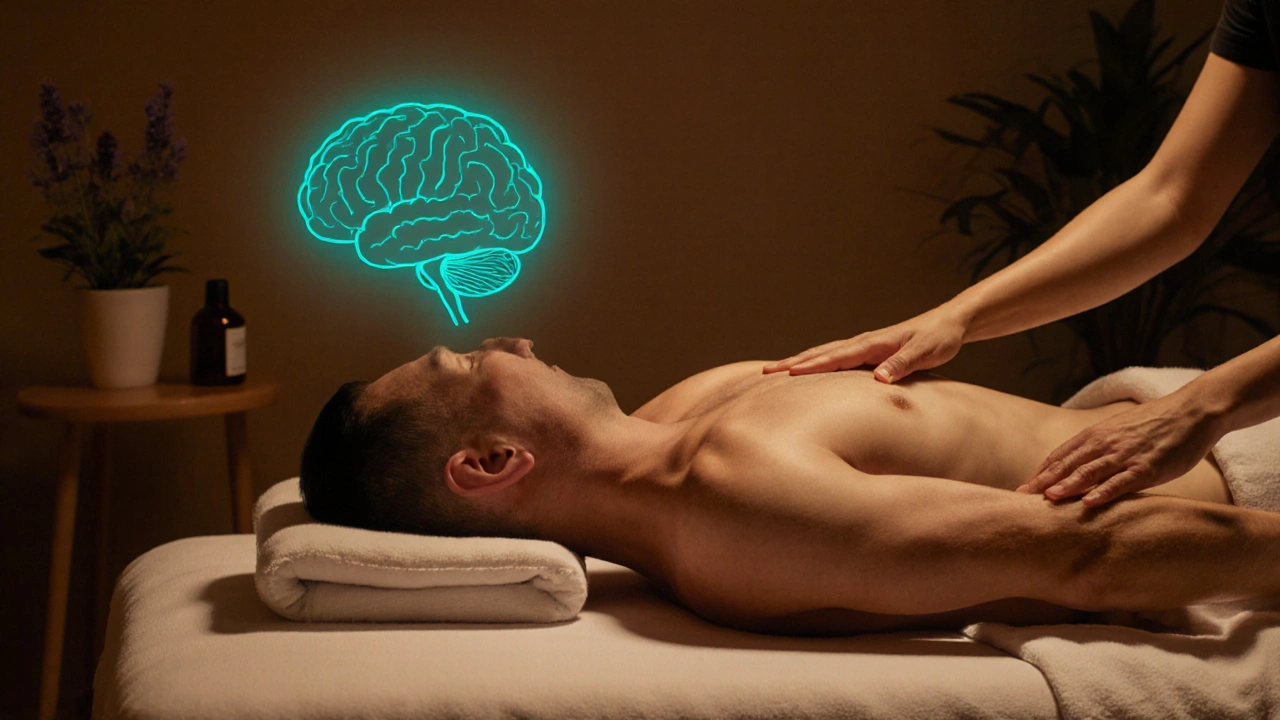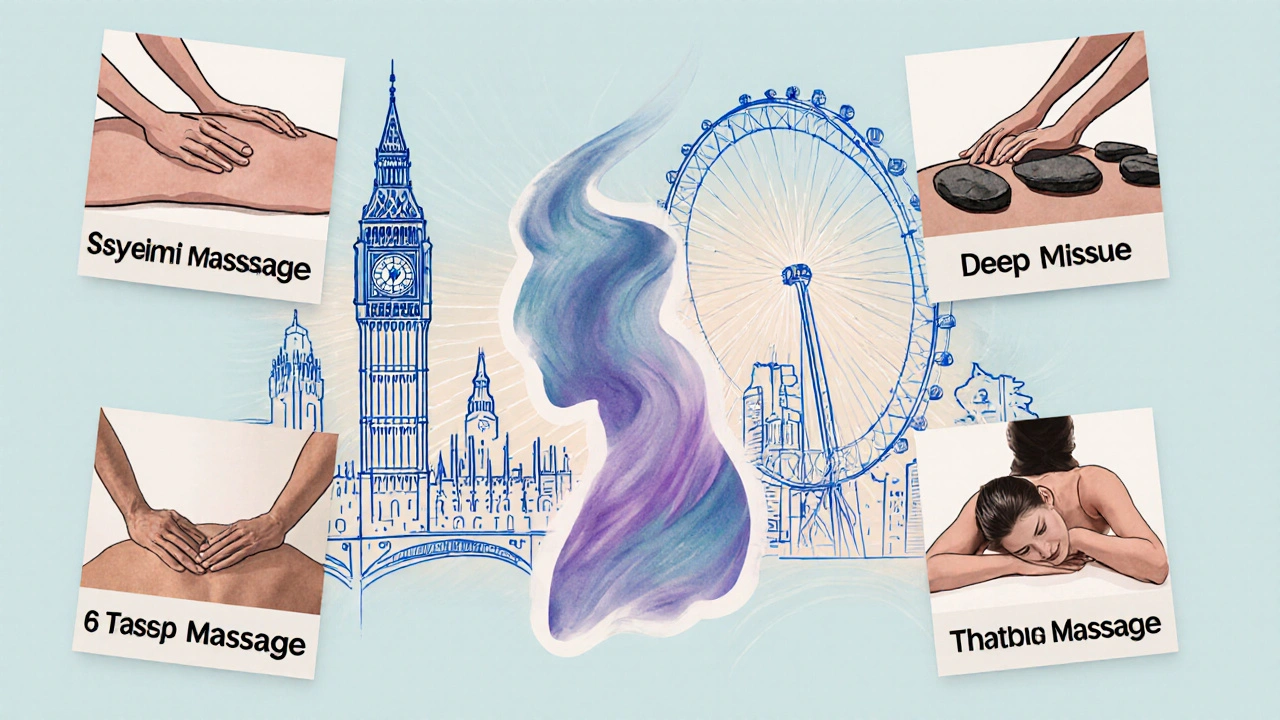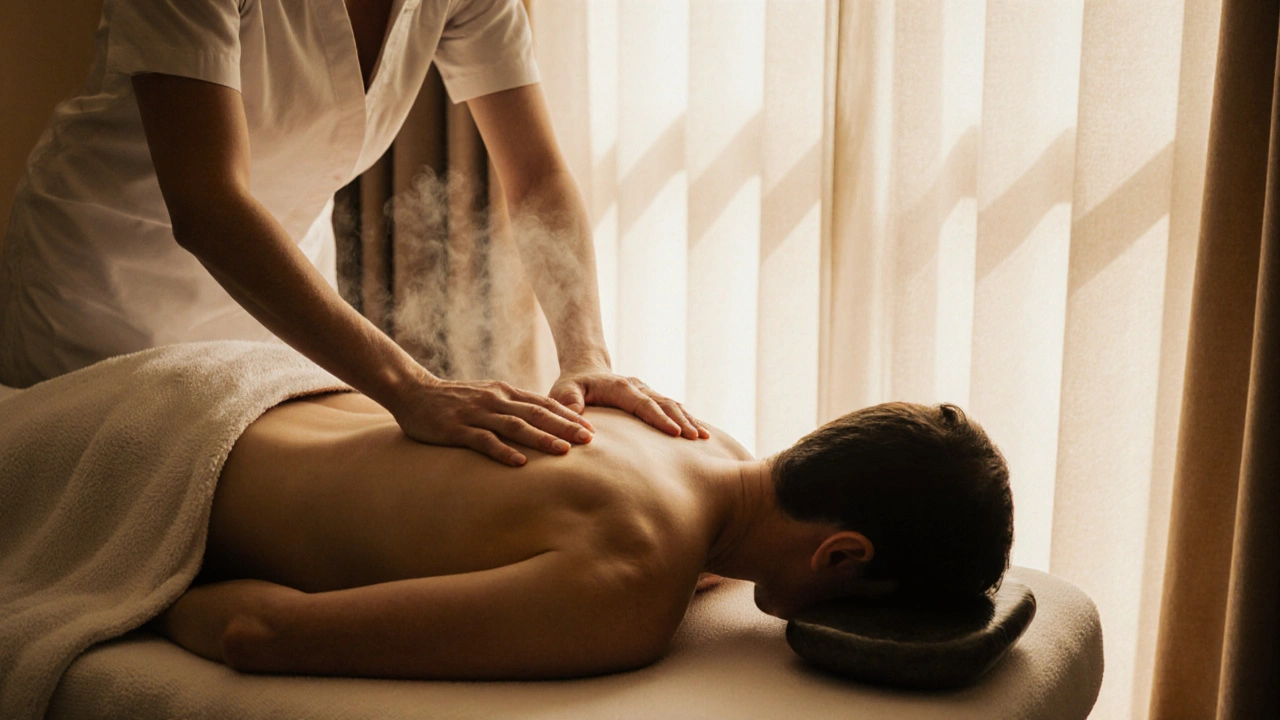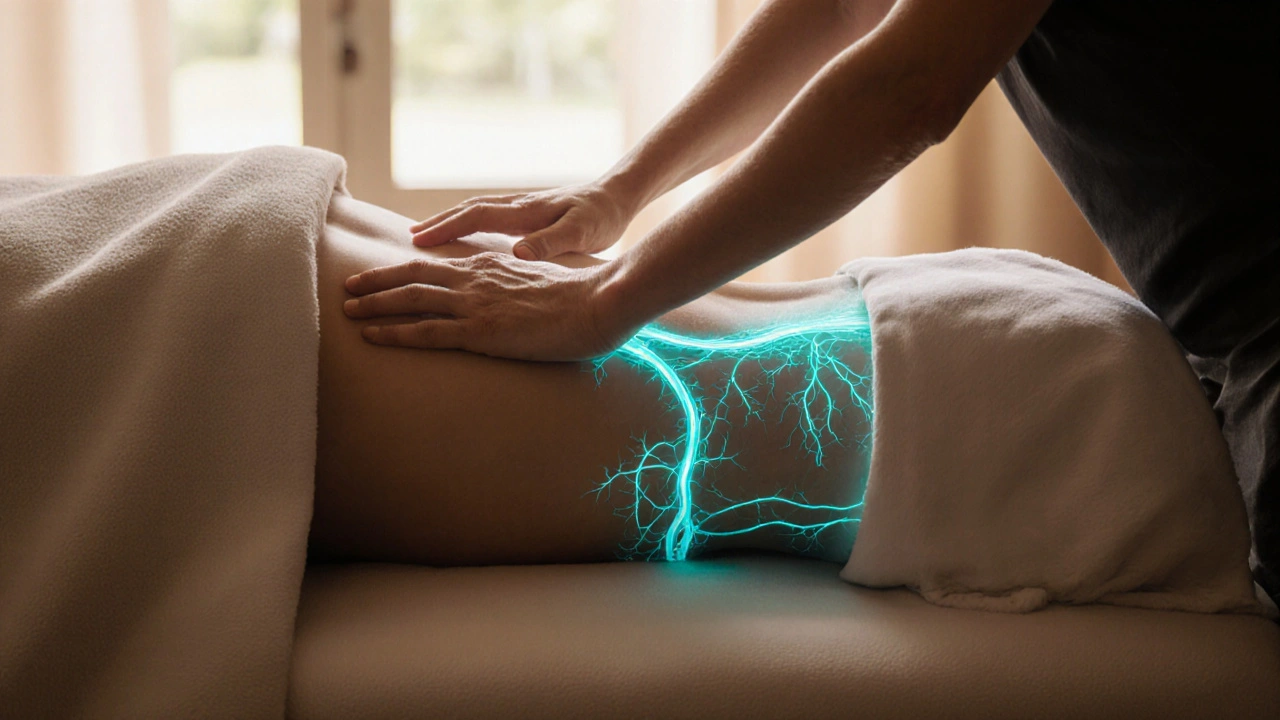Discover how full body massage improves flexibility and mobility by releasing deep muscle tension and fascial restrictions. Learn what to expect, how to find the right therapist in London, and why it works better than stretching alone.

- Created by: Liam Redgate
- Completed on: 26 Oct 2025
- Categories: Massage Therapy
Quick Takeaways
- A full body massage can lower cortisol, raise endorphins, and improve mood.
- It stimulates the lymphatic system and reduces chronic stress.
- London offers a range of styles, from Swedish to aromatherapy‑infused sessions.
- Typical sessions cost £60‑£120 and last 60‑90 minutes.
- Safety tips: stay hydrated, communicate pressure, and avoid massage after recent injury.
Direct Answer
If you’re looking to boost your mental well‑being, a full body massage is a proven, drug‑free way to calm the nervous system, reduce anxiety, and lift your mood.
Understanding the Mind‑Body Connection
The mind‑body connection means thoughts, emotions, and physical sensations constantly influence each other. When stress builds up, the brain releases cortisol, a hormone that keeps you on high alert. Prolonged cortisol can impair sleep, memory, and even immune function. Conversely, when the body relaxes, the brain receives signals that lower stress and promote feelings of safety.
Research from the University of Cambridge (2023) shows that tactile therapies, like massage, trigger the parasympathetic nervous system - the body’s “rest‑and‑digest” mode - which directly quiets the stress response.
What Is Full Body Massage?
Full Body Massage a therapeutic practice that works on every major muscle group, from scalp to soles typically lasts 60‑90 minutes. A therapist uses gliding strokes, kneading, and sometimes light stretching to release tension. The session may include a warm oil or cream and can be tailored to your preferences - firm pressure for deep relief or gentle strokes for pure relaxation.
Unlike a targeted back rub, the full body approach ensures blood flow, lymph drainage, and nerve activation across the entire system, creating a holistic sense of balance.
How Full Body Massage Boosts Mental Health
Several physiological mechanisms link a full body massage to better mental health:
- Stress the body’s alarm response to perceived threats levels drop as massage lowers cortisol by up to 30% (Journal of Clinical Psychology, 2022).
- Endorphins natural pain‑relieving chemicals that also improve mood surge during rhythmic strokes, creating a subtle euphoria called the “massage high.”
- The Lymphatic System a network that removes waste and supports immunity gets a gentle pump, reducing inflammation that is often linked to depression.
- Improved Sleep Quality restorative cycle essential for brain health because the body’s temperature drops after massage, signaling the brain it’s time to rest.
When these processes align, you experience clearer thinking, reduced anxiety, and a brighter outlook.

Types of Full Body Massage Available in London
London’s diverse wellness scene offers several variations:
- Swedish Massage - classic long strokes, ideal for relaxation and circulation.
- Aromatherapy Massage - uses essential oils like lavender to enhance mood.
- Deep Tissue Full Body - targets deeper muscle layers for chronic pain sufferers.
- Hot Stone Full Body - warmed basalt stones add heat therapy.
- Thai‑Inspired Full Body - combines stretching and pressure for a more active experience.
All these styles incorporate the same mind‑body principles; you simply pick the one that feels right for your goals.
Finding a Full Body Massage Therapist in London
Here’s a quick checklist to locate a reputable practitioner:
- Search for therapists registered with the British Association of Massage Therapists (BAMT). Membership means they’ve met safety and training standards.
- Read client reviews on platforms like Google, Yelp, and local wellness forums.
- Verify that the therapist offers a private, sanitized space - especially important after COVID‑19.
- Ask about their experience with mental‑health‑focused massage; many therapists have additional training in stress reduction.
- Check location - central zones such as Covent Garden, Shoreditch, and Kensington have easy transport links.
Word of mouth still rules; ask friends or your GP for recommendations.
What to Expect in a Session
First, you’ll fill out a brief health questionnaire - nothing scary, just to note allergies, injuries, or preferences. The room will be dimmed, with soft music and warm lighting.
The therapist starts at the feet, using long strokes up the calves, then moves to thighs, hips, back, shoulders, arms, hands, neck, and finally the scalp. Expect occasional pauses for you to give feedback on pressure.
After the massage, you’ll have a few minutes to sit up slowly, drink water, and notice any lingering sensations. Many people report a “floating” feeling or a gentle smile emerging spontaneously.
Pricing, Booking, and What’s Included
London rates vary:
- Entry‑level studios: £60‑£80 for 60‑minute sessions.
- Mid‑range boutique spas: £90‑£110 for 75‑minute sessions, often with aromatherapy.
- High‑end wellness centers: £120‑£150 for 90‑minute luxury experiences, sometimes paired with mindfulness coaching.
Most places let you book online via their website or a phone call. Look for “first‑time client” discounts or package deals (e.g., 5 sessions for a reduced price).
What’s usually included: a private room, professional linens, choice of oil or lotion, and a short post‑session debrief.

Safety and Aftercare Tips
To get the most out of your massage and stay safe, follow these simple rules:
- Stay hydrated before and after - water helps flush out toxins released during the session.
- Communicate pressure levels; a good therapist will adjust instantly.
- Avoid heavy meals or alcohol right before the appointment.
- If you have a recent injury, surgery, or skin condition, discuss it openly - the therapist may modify techniques.
- Give yourself 15‑30 minutes after the session before jumping back into stressful tasks; use this time for light stretching or a brief meditation.
Comparison: Full Body Massage vs. Deep Tissue Massage (London)
| Aspect | Full Body Massage | Deep Tissue Massage |
|---|---|---|
| Primary Goal | Overall relaxation and circulatory boost | Targeted release of chronic muscle knots |
| Typical Session Length | 60‑90 minutes | 45‑75 minutes |
| Pressure Level | Medium, adjustable | Firm to intense |
| Impact on Mental Health | High - lowers cortisol, raises endorphins across the body | Moderate - strong physical relief can also reduce stress |
| Average Cost (London) | £60‑£150 | £70‑£130 |
If your main aim is mental‑wellness, the full body approach generally offers broader benefits. Choose deep tissue only if you have specific muscular issues.
FAQ
How often should I get a full body massage for mental health?
Most experts suggest a weekly or bi‑weekly schedule for noticeable mood improvement, especially during high‑stress periods. Once you feel stable, monthly sessions can maintain the benefits.
Can I combine massage with therapy or meditation?
Absolutely. Many clients do a short mindfulness exercise right before or after the massage. The relaxed state makes talking to a therapist easier and can deepen the overall effect.
Is there any risk of feeling dizzy after a session?
A light head‑rush can happen if you stand up too quickly because blood flow shifts. The simple fix is to sit on the edge of the table for a minute, sip water, and stand slowly.
Do I need to book a specific therapist for mental‑health benefits?
Look for therapists who mention stress‑reduction, mindfulness, or mental‑wellness training in their profiles. While any skilled therapist can trigger relaxation, specialized training often means they’ll ask the right questions and adjust techniques for emotional release.
Will insurance cover a full body massage?
In the UK, most private health insurers treat massage as a complementary therapy, so coverage is rare. However, some employer wellness programs reimburse a set number of sessions per year.
Take the Next Step
Feeling the weight of daily stress? A full body massage could be the reset button your mind and body need. Browse local listings, pick a style that resonates, and book a session this week. Your mental health will thank you.
Discover how full body massage can improve digestion, the science behind it, and what to expect from a session in London.
Ready to take the edge off after a long day? This article breaks down how foot massage can quickly ease stress, boost energy, and help you relax at home or at a spa. You'll discover the real perks, simple tips to find great services, and what to expect during a session. Learn the nuts and bolts, plus some clever tricks for getting the most out of every foot rub. Step into a world where downtime actually counts.




Frank ZHANG
October 26, 2025 AT 13:50If you think a 90‑minute rub is a mental‑health miracle, you’re buying hype, not science.
Sheri Gilley
November 4, 2025 AT 20:03I’ve seen clients walk out of a session with a grin you can’t fake 😄. The endorphin boost they talk about is real, and it sticks around for hours. Hydration afterwards is key – water helps flush the toxins you just loosened. Keep the pressure conversation open; a good therapist will tweak it on the fly. Pairing the massage with a quick breathing exercise can double the calm factor. Give it a try and notice the mood lift the next day!
samir nassif
November 14, 2025 AT 02:17In the grand tapestry of somatic experience, the full‑body massage emerges as a ritualistic conduit between flesh and psyche. One would be remiss to reduce such an encounter to mere "stress relief" without acknowledging its ontological implications. The proprioceptive feedback generated by rhythmic strokes stimulates the vagus nerve, thereby orchestrating a cascade of parasympathetic dominance. Contemporary neurophysiology confirms that this cascade modulates the hypothalamic‑pituitary‑adrenal axis, dampening cortisol release. Moreover, the sheer activation of cutaneous mechanoreceptors elicits a surge of β‑endorphins, which function as endogenous mood elevators. When the practitioner calibrates pressure with attuned awareness, the client’s interoceptive awareness expands, fostering a heightened sense of embodied presence. This expansion, in turn, can dismantle maladaptive cognitive loops that perpetuate anxiety. A disciplined practitioner, versed in both somatic theory and affective neuroscience, therefore becomes a catalyst for psychophysiological integration. The London milieu, with its eclectic array of modalities-from the gentle aromatherapy infusion to the resolute heat of basalt stones-offers a laboratory for such integration. Yet the true alchemy lies not in the oil’s fragrance nor the stone’s warmth, but in the intentionality behind each glide. One must also consider the sociocultural substrate: the client’s belief system and therapeutic expectations shape the neurochemical response. Thus, a massage that is merely perfunctory may yield negligible benefit, whereas a session co‑crafted with mindful dialogue can precipitate profound affective shift. Empirical studies from Cambridge and beyond elucidate a statistically significant reduction in Beck Depression Inventory scores after regular full‑body sessions. Nevertheless, these findings are contingent upon adherence to post‑session aftercare, such as hydration and reflective silence. Ignoring such protocols is tantamount to sabotaging the very neuroplasticity one seeks to engender. In sum, the full‑body massage, when executed with scholarly rigor and compassionate intent, stands as a potent adjunct in the modern mental‑health armamentarium.
Nitin Murali
November 23, 2025 AT 08:30Your lavish prose, while ornate, overlooks the pragmatic fact that most London salons lack the scholarly rigor you idealize. Most therapists operate on a service model, not a research lab, so the promised neurochemical cascade is often overstated.
Timothy Mayle
December 2, 2025 AT 14:43The practical outcomes you mention are indeed variable, but they still align with basic physiological principles :) . Consistency in practice tends to smooth out those fluctuations.
David Blair
December 11, 2025 AT 20:57Absolutely, and to add a bit of technical context: the activation of mechanoreceptors triggers a cascade of oxytocin release, which synergizes with endorphins for a compounded anxiolytic effect. Ensuring the client’s environment is temperature‑controlled optimizes vasodilation and toxin clearance. Moreover, integrating a brief mindfulness cue pre‑session can prime the parasympathetic response. These evidence‑based tweaks are standard in high‑performing wellness centers. 🌿
Stephen Robinson
December 21, 2025 AT 03:10While I appreciate the enthusiasm, it’s worth noting that massage alone won’t replace therapy for deep‑seated anxiety. Think of it as a complementary tool, not a standalone solution.
anne tong
December 30, 2025 AT 09:23The premise that a full‑body massage can serve as a panacea for mental distress is a seductive narrative, yet it warrants a measured appraisal. One must acknowledge the heterogeneity of individual psychophysiological responses, which precludes a universal guarantee of benefit. Moreover, the socioeconomic accessibility of premium London spas raises questions about equitable distribution of such interventions. It is prudent, therefore, to situate massage within a broader, multimodal mental‑health strategy rather than elevate it to a singular remedy. A balanced perspective honors both its potential and its limitations.